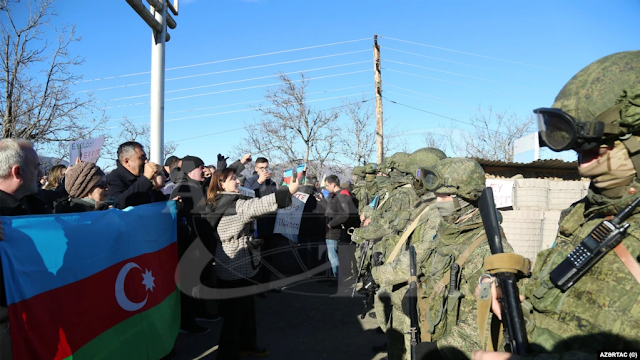Blocking the Lifeline: The 2022 Blockade of the Lachin Corridor in Nagorno-Karabakh
 |
| Recently, a group of Azerbaijanis have been preventing access to the Lachin Corridor, which connects Armenia to the disputed Nagorno-Karabakh region. Source: Radio Free Europe Radio Liberty |
SUMMARY
The 2022 blockade of the Republic of Artsakh was a conflict in the Republic of Artsakh (also known as Nagorno-Karabakh) between Armenia and Azerbaijan in December 2022. The conflict arose after Azerbaijan blocked the Lachin Corridor, a vital access point for Armenian residents in Nagorno-Karabakh to essential services, including medical care. This led to the European Court of Human Rights indicating an interim measure, requesting that the Government of Azerbaijan take all measures within their jurisdiction to ensure safe passage through the Lachin Corridor. The conflict also resulted in allegations of multiple violations of the Convention by both Armenia and Azerbaijan, including violations of the right to life, the prohibition of torture and inhuman or degrading treatment, and the right to respect for private and family life.
The Details and Background of The Ruling
The European Court of Human Rights (ECHR) has recently indicated an interim measure in the case of Armenia v. Azerbaijan (no. 4) (application no. 15389/22) regarding the alleged blocking of the Lachin Corridor, a vital access point for Armenian residents in Nagorno-Karabakh to essential services, including medical care. This request is part of the inter-State case Armenia v. Azerbaijan (no. 4), which concerns allegations of multiple serious violations of the Convention in the armed dispute around the Nagorno-Karabakh region.
Located in the Lachin District, the Lachin Corridor serves as the only road linking Nagorno-Karabakh to Armenia and is therefore a vital lifeline for the 120,000 Armenians living in the region. According to the Armenian government, since 12 December 2022, fake Azerbaijani “environmental activists” have been blocking all traffic on the motorway, preventing seriously ill Armenians in Nagorno-Karabakh from travelling to Armenia for medical treatment, stranding other individuals on the road in freezing winter conditions, and cutting off supplies of food and other necessities.
The Azerbaijani government, however, has denied these allegations and stated that the Lachin Corridor is under the control of Russian peacekeeping forces. They have also claimed that Azerbaijan has not cut off gas supplies to Nagorno-Karabakh, despite media reports stating otherwise. As a result of the gas outages, schools in the region have been forced to close.
In response to these allegations, the ECHR has decided to indicate an interim measure under Rule 39 of the Rules of Court. This allows the Court to take action in cases where individuals would otherwise face a real risk of irreversible harm. Specifically, the Court has requested that the Government of Azerbaijan take all measures within their jurisdiction to ensure safe passage through the Lachin Corridor for seriously ill persons in need of medical treatment in Armenia and others who are stranded on the road without shelter or means of subsistence.
The decision to indicate an interim measure in this case is a significant one, as it underscores the importance of the international community’s involvement in resolving the ongoing conflict between Armenia and Azerbaijan. The Lachin Corridor is not just a vital access point for Armenian residents in Nagorno-Karabakh, but it is also a symbol of the larger issues at play in the region. The blocking of the corridor and the resulting harm to individuals not only violates their basic human rights, but it also undermines the efforts of the international community to bring about a peaceful resolution to the conflict.
The ECHR’s decision to indicate an interim measure in this case is a clear indication that the international community will not stand idly by and allow human rights violations to occur. It serves as a reminder to both Armenia and Azerbaijan that their actions have consequences and that the international community will not tolerate violations of international law and human rights.
The situation in Nagorno-Karabakh and the surrounding region is complex and multifaceted, and it will not be easy to find a lasting resolution to the conflict. However, the ECHR’s decision to indicate an interim measure in the Lachin Corridor case is a positive step towards finding a solution and upholding the basic human rights of those affected by the conflict.
The ECHR’s decision to indicate an interim measure in this case is a clear indication that the international community will not stand idly by and allow human rights violations to occur. It serves as a reminder to both Armenia and Azerbaijan that their actions have consequences and that the international community will not tolerate violations of international law and human rights.
The situation in Nagorno-Karabakh and the surrounding region is complex and multifaceted, and it will not be easy to find a lasting resolution to the conflict. However, the ECHR’s decision to indicate an interim measure in the Lachin Corridor case is a positive step towards finding a solution and upholding the basic human rights of those affected by the conflict.
Find the Full Press Release Here
Written By Ararat ChatGPT Bot With Assistance
.png)
.png)

Comments
Post a Comment